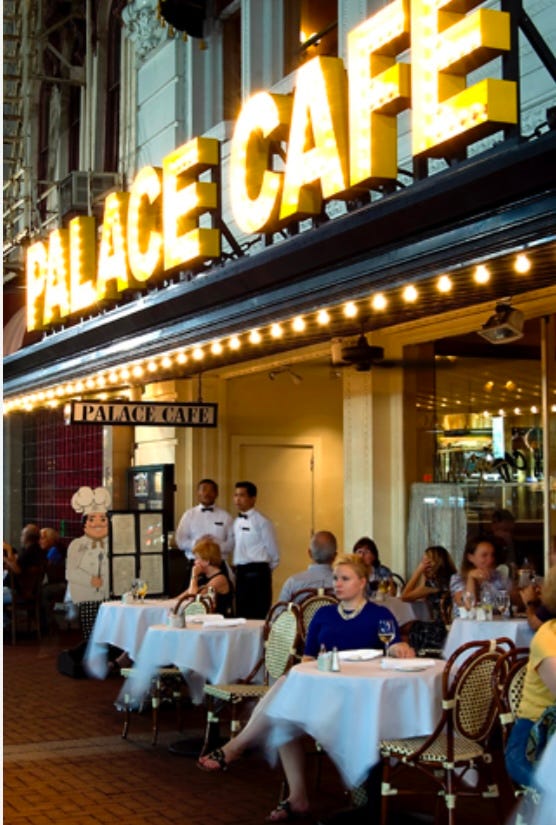How This Farming Entrepreneur Reinvented The CSA Box
Ryan Poe came up with a way to involve the restaurant community
Hello, and welcome to the CulinaryWoman Newsletter! It’s already mid-July, and hopefully you’re enjoying bountiful fruit and vegetables at your farmers markets. It’s fun to see the number of people who are following CulinaryWoman on Substack, and our subscription numbers are growing all the time.
CulinaryWoman doesn’t take advertisements or have sponsors; it’s all audience-supported. Remember that if you don’t want to commit to a monthly or annual subscription, you can Buy Me A Coffee in any amount to support my work.
This week, I’m introducing you to a farmer who transformed into a entrepreneur during the pandemic, and is now curating something unique.
Transforming CSA boxes
I’ve always been a fan of CSA boxes. In case you don’t know, CSA stands for Community Supported Agriculture, and the boxes are a concept that began in Japan and Euroope during the 1980s.
Under the plan, onsumers purchase weekly packages of farm-grown vegetables and fruits. They’re mainly an assortment of what’s seasonally fresh, and they give cooks a chance to enjoy the ripest possible crops.
In recent years, CSA boxes have evolved in a number of ways. While the original plan was for consumers to sign up for a season, a number of places allow Rather than a set amount of produce, buyers can choose different sizes of farm shares, from a individual box to one for a family.
Some CSA organizations allow their members to delete items they don’t want and add those that they do. For instance, double blueberries, and hold the kale. A number of plans offer pantry items, baked goods, dairy products and even desserts.
When I lived in New Orleans, I had a bi-weekly subscription to a box from Covey Rise Farms. Along with the usual fruits and vegetables, I could opt for bread, goat cheese and even add on premium beef and chicken. While I picked up my box, they also could be delivered for a small fee, a convenience that a number of CSA offer.
Once I got back to Ann Arbor, I discovered that Ryan Poe had taken the CSA concept and transformed it into something unique.
A local food collective
Ryan, who lives and farms in Dixboro, a village east of Ann Arbor, is the creator of The Hungry Locavore. He calls it a “local food collective” that is meant to highlight products from farms, restaurants and other food creators.
Each week, Ryan offers a box that is aimed at area food lovers. While it includes produce, it also has prepared items, such as salads, dips, main dishes and desserts. He often chooses a theme for the week, such as brunch, Mexican, Italian or Asian food.
The boxes generally cost around $70 to $75, and have enough food for multiple meals.
Ryan’s most recent box, called Independence Day After Party, included red curly lettuce, green curly kale, Japanese green onions, cucumbers, carrots, blueberries, organic rolled oats, a pizza kit with ingredients for a sausage or a mushroom pizza, pasta salad, garbanzo bean salad and a brownie.
The participants included a series of farmers across the area, as well as Silvio’s Trattoria & Pizzeria, Zingerman’s Deli and Zingerman’s Bakehouse.
The number of takers varies per week: in slow months, Ryan might only sell 20 boxes, but busy times see him filling 50-60 boxes. Long-term, he’d like to fill 75 a week, which is about his maximum, since he’s essentially working by himself.
“It appeals to a lot of people because it’s flexible. The farms are different, the restaurants are different, the price is different,” Ryan says.
Filling multiple purposes
The boxes serve several purposes beyond simply selling food to people. Ryan wants his customers to get acquainted with the farms and the food producers who supply his boxes. That’s especially important for small makers who have booths at the Ann Arbor Farmer’s Market, or who operate from their own spaces across town.
“It’s definitely not traditional, but we’ve seen it working,” Ryan tells me.
Lately, the boxes are an outlet for the crops he is growing himself. Ryan is leasing a hoop house and a section of an 80 acre farm. He’s put several thousand plants into the ground, including tomatoes, cucumbers and pappers, and he’s now begun harvesting.
Recently, his garlic was used in a dish from Dave Makes Pasta, a local pasta maker who I’ve profiled in the newsletter.
He’s recently recruited four new farms and several restaurants who had never participated in boxes before. “A lot of people are intimidated by it. They don’t know what they’re getting into. Then they let their hair down, and say, ‘this is easier than I thought,’” Ryan says.
Along with his boxes, he’s selling produce to local shops under the Hungry Locavore label, so even people who aren’t subscribers can taste what he is growing. He hopes that seeing his logo will lead people to his website to check out his weekly offerings.
After subscribing to his newsletter, “We see people sit on the fence for two or three boxes. Then, they buy a box, and we see them every week,” Ryan says.
He goes on, “People ask me if I make a lot of money with it. I’ll say, not a ton, but it isn’t a get rich fast or even get rich idea.”
Check out The Hungry Locavore here and please let Ryan know if you read about him in CulinaryWoman.
Black-Owned Restaurants Find A Yelp Tag Doesn’t Help Their Ratings
In 2020, Yelp created a Black-Owned tag, which was particularly crucial for businesses in Detroit and Los Angeles. It hoped that would raise their visibility and allow people to seek out places run by entrepreneurs of color.
However, a study by researchers from the Universities of Michigan and Pennsylvania found that it did not boost the ratings that they received from customers.
Matthew Bui of Michigan and Cameron Moy of Penn created a database of 250,000 users on Yelp from those two cities.
They found that reviewers gave Black-owned businesses 3.03 stars, on average, compared with the average of 3.78 stars for businesses that did not carry a Black-owned designation.
The researchers theorized that the disparity came becasue Yelp’s user base is primarily white, educated and affluent.
They said those users tended to criticize the service they received in Black-owned businesses, calling staff “slower” and “rude” compared with the treatment they encountered elsewhere.
Wrote the researchers, “These findings may seem surprising given that Detroit is a majority Black city. However, Black users on Yelp are a minority. Keeping in mind the skewed user base of Yelp, we hypothesize the lower reviews for businesses featuring a Black-owned tag reflect existing racial and digital divides in the city.”
A Vintage Fast Food Chain Plots A Comeback
Do you remember Roy Rogers — not the cowboy singer, but the roast beef chain? At its peak, there were more than 650 outlets of Roy Rogers, which was founded in 1968.
Sold to Marriott in 1980, Roy Rogers locations began to dwindle. Now, there are only 24 company owned and 16 franchise restaurants left in seven states.
However, Roy may be getting on his horse again, metaphorically speaking. Fox Business reports that a new Roy’s has opened in Cherry Hill, N.J., bringing the restaurant back after an absence of 30 years in South Jersey.
According to photos posted on Instagram, the new Roy’s looks more upscale than its predecessors. The owners are promising, “more to come.”
A Familiar Spot Closes In New Orleans
For 34 years, the Palace Cafe on Canal Street in New Orleans was among the most visible restaurants in the Brennan Family empire. It introduced many tourists and convention attendees to New Orleans cuisine, and it had the space that local groups needed to dine comfortably.
But last week, the Palace abruptly closed. According to a statement, the restaurant blamed a recent court ruling that was related to its lease.
Fox 8 TV reported that the restaurant was nearing the end of a 35-year lease that included a purchase agreement, but a dispute arose between Dickie Brennan and Co. and the building’s owner, Philip Werlein Ltd. over the value of the property.
According to court records, Judge Ellen Hazeur ruled in favor of the Werlein family in June. That ruling is being appealed by the Brennan group, which said new lease terms were too steep to continue.
The Brennans aren’t giving up hope for reviving the Palace someday. “Should the right opportunity arise, we will welcome it with open arms. In the meantime, you can still find us doing what we love at our sister restaurants across the city,” the family said.
Keeping Up With CulinaryWoman
In case you missed it, I wrote about the new book, The Obituary Cocktail, in a special edition of The CulinaryWoman Reading Room. There will be a launch party for author Sue Strachan at the Garden District Bookshop in New Orleans on Friday. You can also order an autographed copy. It will make a great guest gift, maybe with the appropriate liquors included.
I spent a fun hour last week on Maine Calling, a daily call-in show from Maine Public Radio. We discussed all kinds of automotive topics, from EVs and EV chargers, to car buying and leasing, to keeping your car maintained for the summer. It was fun to hear from callers across Maine, including a number of EV and hybrid owners.
Lions, Towers & Shields looked at a classic noir film, Sorry, Wrong Number, which is one of the scariest movies that Barbara Stanwyck ever made. Don’t watch this one in the dark.
I’m always happy to hear from CulinaryWoman readers and to entertain story pitches. Here’s how to find and follow me.
Website: www.michelinemaynard.com
Email: culinarywoman (@) gmail dot com
Threads and Instagram: (@) michelinemaynard
Bluesky: mickimaynard.bsky.social
TikTok: CulinaryWoman
Tomorrow, I’ll be back for paid subscribers with Red Beans & Rice. I’m looking at the latest trend in summer celebrations: cake picnics.
Have a good week and see you next Sunday.









Re Palace Cafe - I think that worst problem for Dickie Brennan and co is that Palace is their headquarters. Having to move headquarters is a major issue.
Re CSAs: I hate them. I have never been satisfied with what I have gotten on a regular basis. Sometimes there was a good week, but I often felt that I was getting what was easy to grow and not interesting food.
It was dismaying to read about the Yelp ratings differences between businesses that identify as Black-owned versus those that do not.
I have been to the Palace Cafe and was sorry to read it had closed. Its food wouldn't set the world on fire, though I found it to be consistently good. It had a very convenient location, and service was generally very friendly. The Werleins and Brennans are both well-known, established NOLA families. I hope they can negotiate a mutually-acceptable agreement that will allow the Palace to remain in its present location.